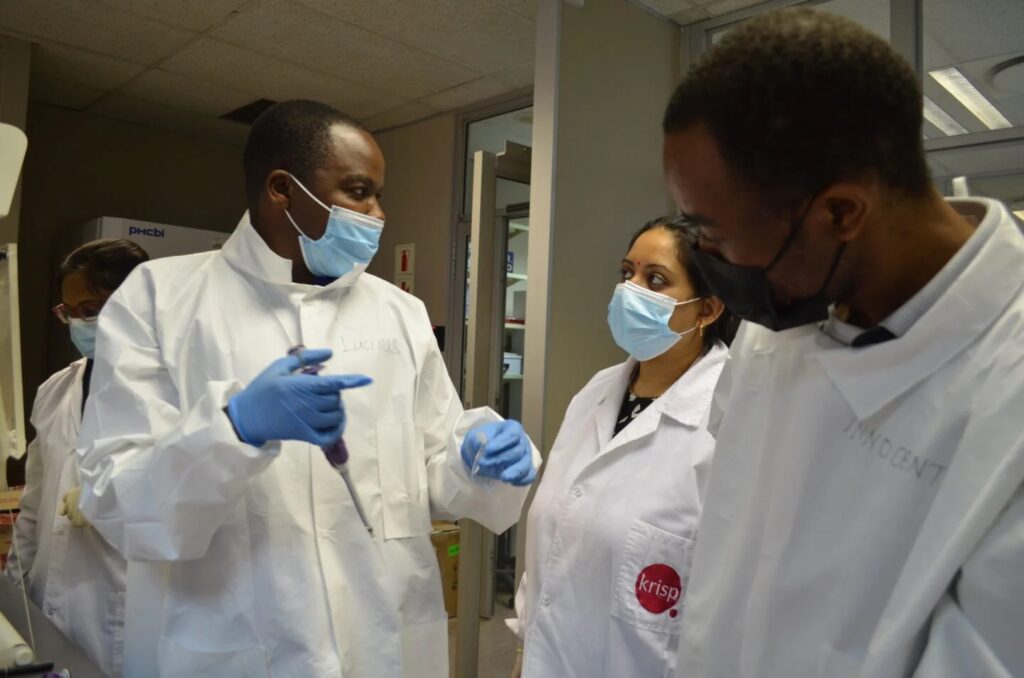ADF STAFF
When the COVID-19 pandemic first hit Malawi, the country had just one lab and four staff members sampling SARS-CoV-2 viruses.
“On a normal day, I was at work by 6 a.m. and tried to leave by 8 p.m.,” technologist Lucious Chabuka told the Rockefeller Foundation. “After a few weeks, we started going to other labs and training them on how to test for SARS-CoV-2.
“As people returned to the country from South Africa, we collected samples at the border. We had about 500 clinical specimens coming in every day for the four of us to analyze.”
From humble beginnings two years ago, the continent has seen a rapid expansion of genomics surveillance through a far-reaching scientific collaborative network. This led to a major increase in the number of sequences generated, according to a new study.
“The enormous leap Africa made in genomic surveillance during the past two years is the silver lining in the COVID-19 pandemic,” World Health Organization (WHO) Regional Director for Africa Dr. Matshidiso Moeti said in a statement.
“The continent is now better prepared to face down both old and emerging pathogens. This is a model of how when Africans are in the driving seat we can come up with lasting change and stay a step ahead of dangerous diseases.”
Africa’s COVID-19 surveillance network provided an early warning of the omicron variant to the world, and it allowed scientists and public health officials to illustrate the introduction and spread of variants across the continent in real time.
The study, titled “The evolving SARS-CoV-2 epidemic in Africa: Insights from rapidly expanding genomic surveillance,” was published on September 15 in the journal Science.
With more than 300 authors, it was the largest group of African scientists and public health institutions working together to support the data-driven COVID-19 response in Africa.
They have collaborated to analyze more than 100,000 genomes.
The study was led by two labs that set up the genomics surveillance network in South Africa: the Centre for Epidemic Response and Innovation (CERI) at Stellenbosch University and the KwaZulu Natal Research and Innovation Sequencing Platform (KRISP) at the University of KwaZulu-Natal, both in South Africa.
The network coordinated with the Africa Centres for Disease Control and Prevention (Africa CDC), the WHO and 300 institutions across the continent.
Lead author Houriiyah Tegally, a bioinformatician at KRISP and CERI, believes the network can be a model for how scientists and public health officials can collaborate across great distances to fight infectious diseases in the future.
“It has been an inspiring experience to share knowledge, support and learn from colleagues in all parts of the continent continuously during the pandemic,” she said.
“We witnessed small countries with no previous genomics experience become empowered in sequencing and bioinformatics methods and start to actively participate in regular pathogen genomic surveillance for SARS-CoV-2.”
On October 12, 2020, a group of public, private and nonprofit organizations led by the Africa CDC launched a $100-million, four-year partnership called the Africa Pathogen Genomics Initiative.
Its aim was to expand access to the latest genomic sequencing tools and expertise to strengthen public health surveillance and laboratory networks across the continent.
Sequencing more than 100,000 viral genomes is a substantial achievement considering the timeline.
By the end of 2020, the network had sequenced 4,000 genomes. Former Africa CDC director Dr. John Nkengasong set a goal for Africa to contribute 50,000 genomic sequences to the global database by the end of 2021.
Dr. Yenew Kebede of the Africa CDC said sustained investment in this arena is necessary for Africa to lead the fight against “emerging, re-emerging, endemic infectious disease threats, such as Ebola, HIV/AIDS, TB and Malaria.”
“These investments are crucial for pandemic preparedness and response and will serve the health of the continent well into the 21st century,” he said.

